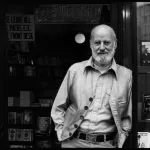This is our welfare half
a duplex with mint green
siding shrugged between
rail yard and main street
logging trucks and trains
shake the foundation so
much I mistake them for god
forever it is winter mom
dissolves into mentholated
smoke and Coffee-Mate at
the kitchen table painting
orcas and nor'easters in burnt
umber and verdigris until
the fuel we burn for heat
dissipates I find
my brother sitting
blue-tinged in his crib
mucus freezing to his
tiny upper lip come
spring he gets up on two
feet to press his left hand
onto her canvas leaves his
mark in the sky just over
where a suggestion
of light snuck out
through the rippled
storm cloud a copper
coin shining onto where
the waters calm at a
distance from the
anonymous
shore
Sometimes a scent or a site or a taste can sweep you up into the past. This finely honed narrative poem knows what that’s like.
- The lack of punctuation in the poem suggests that it recounts a single memory or a single scene. Can you tell whether or not the speaker of the poem is in involved in, in witness of, or in control of what’s happening? How can you tell?
- What does the poem’s title suggest to you?
- What effect does the speaker’s use of verbs create?
- What clues point to the age of the speaker?
- How would you treat each line break in a recitation of this poem — would you communicate any of them to your audience with a pause?
- Think of a vivid scene from your childhood that has stuck with you and create your own narrative poem from it.
Useful Links
Listen to Liz Howard read her poem “Boreal Swing”: https://www.youtube.com/watch?v=XhU5h4Ct8Zg
And to her read a poem called “Thinktent” at the 2016 Griffin Poetry Prize: https://www.youtube.com/watch?v=pUssJLoqzgY
Liz Howard, “1992” from Infinite Citizen of the Shaking Tent. Copyright © 2015 by Liz Howard. Reprinted by permission of the publisher.
Source: Infinite Citizen of the Shaking Tent (McClelland & Stewart, 2015)





